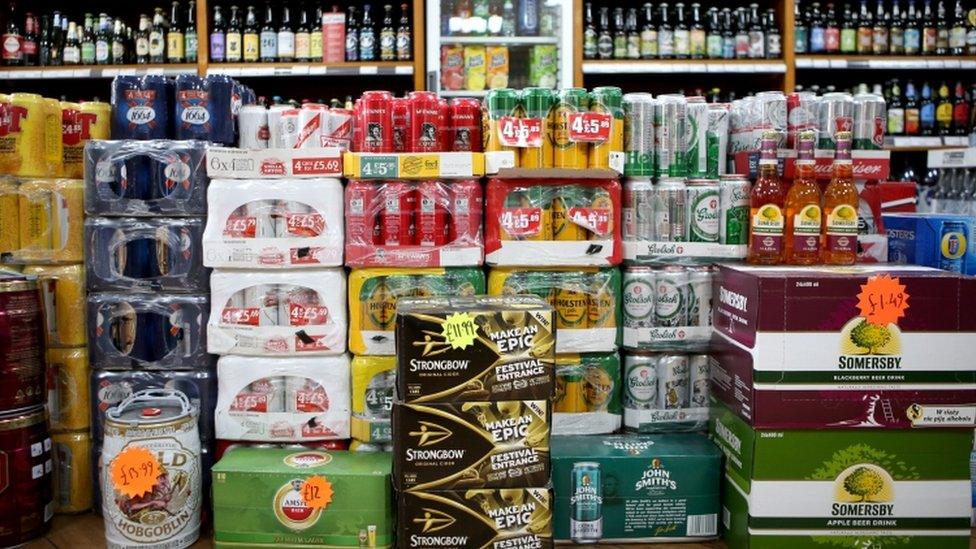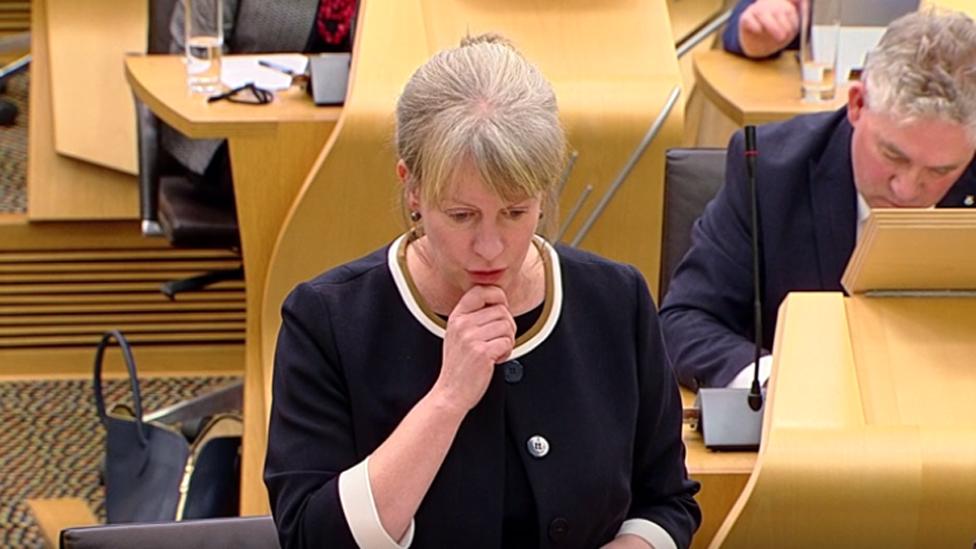Minimum alcohol pricing in Scotland to start in May
- Published

The policy is largely aimed at cheap, high-strength alcohol in supermarkets and off-licences
Scotland will introduce minimum pricing for alcohol on 1 May next year, the Scottish government has announced.
The move will raise the cost of the strongest, cheapest alcohol by setting a minimum price per unit.
Health Secretary Shona Robison told MSPs that she expected the price to be set at 50p-per-unit, but this will be subject to a consultation.
She said the measure was needed to tackle the "devastation" caused by cheap, high-strength alcohol.
The 50p-per-unit minimum would raise the price of the cheapest bottle of red wine (9.4 units of alcohol) to £4.69, while a four-pack of 500ml cans of 4% lager (8 units) would cost at least £4 and a 70cl bottle of whisky (28 units of alcohol) could not be sold for less than £14.
Normal strength cider (5% ABV) would cost at least £2.50 a litre but a super-strength version (7.5% ABV) would have to cost a minimum of £3.75 for a litre.
Key weapon
Minimum pricing is largely aimed at cheap lager, cider and spirits sold in supermarkets and off-licences.
But it would leave more expensive drinks unaffected, and is unlikely to impact on sales in pubs and clubs.
The Scottish government views the measure as a key weapon in the battle against binge drinking, with people in Scotland said to buy 20% more alcohol on average than those in England and Wales.
Alcohol Focus Scotland research from last year suggested that the maximum recommended weekly intake of alcohol - 14 units - could be bought for just £2.52, with super-strength cider and own-brand vodka and whisky available from as little as 18p per unit of alcohol.
The Scottish Parliament passed the minimum pricing legislation five years ago but it was tied up in a legal challenge by the Scotch Whisky Association (SWA) until last week, when the Supreme Court ruled that it did not breach EU law.
Judges ruled unanimously that the policy was a "proportionate means of achieving a legitimate aim" - with the SWA agreeing to pay the Scottish government's legal costs.
Minimum pricing has been broadly welcomed by health bodies and alcohol awareness groups, who say it will target the kind of drinking that leads to the greatest harm.
There were 1,265 alcohol-related deaths in Scotland last year, an increase of 10% on 2015 - figures which Ms Robison described as "completely unacceptable".

Ms Robison confirmed the start date in the Scottish Parliament
Speaking in the Scottish Parliament, the health secretary said the delays to minimum pricing meant lives had been lost that might not have been, and stressed her commitment to implementing the policy "as soon as it is practicable".
She said: "With alcohol on sale today at just 18p a unit, we have to act to tackle the scourge of cheap, high-strength drink that causes so much damage."
Ms Robison said research had shown that a minimum unit price of 50p would cut alcohol-related deaths by 392 and hospital admissions by 8,254 over the first five years of the policy.
She added: "I anticipate setting the minimum unit price at 50p per unit. We now want to hear from retailers, representative bodies and Licensing Standards Officers about the practicalities of implementation."
All additional money raised by the increase in pricing will be kept by the retailer.
The legislation has a "sunset clause", which means it will be reviewed after five years before a decision is taken on whether it should continue, and in what form.

What has been the reaction?
While welcoming the confirmation that the policy will finally be implemented, some people have questioned whether the 50p minimum price - which was recommended five years ago - will be enough to achieve the policy's objectives.
Dr Chris Holmes from Sheffield University, who carried out much of the initial research into minimum pricing, told BBC Scotland that there was now "certainly an argument for looking at a higher level" than 50p.
He explained: "When we first did this work, around three-quarters of alcohol in Scotland was sold for less than 50p per unit; today it's around half of all alcohol.
"So there is an argument that the Scottish government may want to look at whether and when to increase the minimum price threshold to ensure it retains its effectiveness."
Scottish Conservative deputy leader Jackson Carlaw also welcomed Ms Robison's announcement, but said there had to be a discussion around the 50p rate.
He asked: "Not only is that figure now five years old, but will it be suitable for another five years as this policy develops?"
Scottish Labour's Colin Smyth highlighted new figures which he said showed that alcohol-related hospital admissions are eight times higher among people from the most deprived communities.
Calling for "real change" to tackle Scotland's drinking culture, he said: "The reality is the SNP has slashed funding for alcohol and drug partnerships by 24% in recent years, cutting support for people including the poorest in the most deprived communities."
Scottish Liberal Democrat leader Willie Rennie is among those to have call for a 60p minimum price, which he said would reflect the impact of inflation and other factors over the past five years.